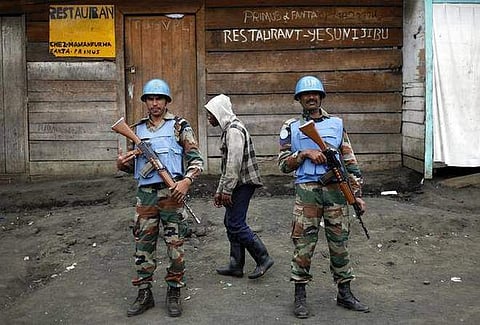

UNITED NATIONS: India, one of the top police contributors to UN peacekeeping missions, has said deployment of police units should be based on clear and achievable mandates and after detailed consultations between the Security Council and the contributing countries.
Indo-Tibetan Border Police Director General R K Pachnanda speaking at the 2nd United Nations Chiefs of Police Summit last week said the timing of deployment and role of the police in peacekeeping varies according to specific contexts.
"Their capabilities and responsibilities are distinct from the military peacekeeping troops. Their mandates also have to be clearly aligned with the tasks they are trained to handle and distinct from those of the peacekeeping troops," he said.
Pachnanda said the primary role of the police in UN peacekeeping missions is to train and build capacity of the host nation to enable them to build sufficient expertise and skills in policing, an important task in enforcing and maintaining the rule of law.
"While a rapid deployment of Formed Police Units may be required in certain contexts, such deployment should be based on clear and achievable mandates supported by adequate resources, as also well-informed decisions based on consultations between the Security Council, police contributing countries and the UN Secretariat," he said.
He stressed that on the ground, a closer coordination between the UN Police, host government's law enforcement machinery and the civilian population is essential to improve the efficiency of policing in the context of a mission.
"We believe that situational awareness within the mission jurisdiction is of importance for the effectiveness of a Mission.
At the same time, we understand the sensitivities involved and the need for a careful and cautious approach on these issues," he said.
He emphasised on more structured and regular interface between the UN Police and military components of the mission.
He said India supports the idea of compiling field experiences and best practices followed by the UN Police in various peacekeeping missions.
Apart from being the largest cumulative troop contributor to UN peacekeeping missions, the country is also one of the top police contributors with 552 police personnel currently deployed in various missions including in Haiti, Democratic Republic of Congo, Cyprus and South Sudan.
Since 1995, around 2,700 Indian police officials have been deployed in UN Peacekeeping operations.
The first ever all-women Formed Police Unit (FPU) deployed by India at the UN Peacekeeping Mission in Liberia (UNMIL) served as a role model to Liberian women, with the percentage of Liberian women in their country's security sector increasing three times following the deployment of the all-female Indian contingent, Pachnanda told the UN summit.
During the 2015 Leaders' Summit on Peacekeeping, India had pledged three Formed Police Units (FPUs) including an all-women unit.